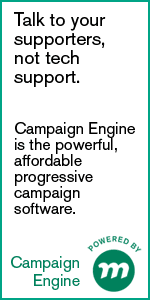« Weekly Open Thread: What Races Are You Interested In? | Main | OH-06: Wilson Pursuing Write-In Route »
Monday, February 27, 2006
SCOTUS Hearing Two Important Election-Related Cases This Week
Posted by DavidNYCThe Supreme Court is hearing oral arguments in two big campaign & election-related cases this week. The first concerns Tom DeLay's mid-decade re-districting in Texas. The second involves Vermont's new spending limits law.
There are two major issues in the first case. One is whether partisanship is an acceptable reason for redistricting. The other is whether the new Texas plan violated the Voting Rights Act. On the first score, I don't think the SCOTUS will overturn - most justices seem really antsy about whether you can develop a fair "test" to see when partisanship has been used permissibly vs. impermissibly. I think the VRA challenge is probably the stronger one, especially since (as you may recall) DoJ attorneys said the Texas plan violated the VRA but were over-ruled by political appointees. Ultimately, I'd expect perhaps some small court-ordered changes to the DeLaymander, but not a full-scale roll-back.
The second case has gotten a lot less attention but I think it's potentially just as - if not more - important than the first one. Vermont passed a new law saying that candidates could only spend certain amounts while seeking election. The Supreme Court pretty clearly said such limits were invalid because they violated free speech rights, back in Buckley v. Valeo thirty years ago. (Contribution limits, however, were upheld in Buckley.) The Supremes would pretty much have to over-rule (or creatively side-step) Buckley in order to uphold these VT laws, but if they did, the consequences could be very far-reaching.
I personally am of two minds on spending limits. On the one hand, they might really help to take money out of politics. (Whereas contribution limits just mean that candidates have to spend more time seeking money from a great number of people.) On the flip-side, I worry that such limits on campaigns would only increase the flood of unaccountable third-party money. I also think that first amendment concerns have to come into play at some point - surely if VT said that candidates couldn't spend any money, that would violate free speech rights. And when it comes to seats in the state House - where the law says you can only spend $2,000 - that's getting awfully close to zero. (And, I think, it probably only helps incumbents.)
Anyhow, what really matters, of course, is what those nine black-robed justices think - and we won't hear from them until June. Stay tuned.
Posted at 04:12 PM in Supreme Court | Technorati
Trackback Pings
TrackBack URL for this entry:
http://www.swingstateproject.com/mt/mt-track-ssp.cgi/2188
Comments
Except that there are 150 members of the state house- which makes it so there are about 1 member for ever 4,000 people, which makes it so $2,000 isnt that much of a big deal. Also, what do you mean by "unaccountable third-party money"
Posted by: liberalminded ![[TypeKey Profile Page]](http://www.swingstateproject.com/nav-commenters.gif) at February 28, 2006 08:42 AM | Permalink | Edit Comment | Delete Comment
at February 28, 2006 08:42 AM | Permalink | Edit Comment | Delete Comment
ALso, if your argument is really true that free speech applies to money, than shouldn't Americans be allowed to donate money to terrorists?
I just dont see how spending limits on campaign finances even relate to the Constitution. I believe in a living constitution, but not that living.
Posted by: liberalminded ![[TypeKey Profile Page]](http://www.swingstateproject.com/nav-commenters.gif) at February 28, 2006 08:47 AM | Permalink | Edit Comment | Delete Comment
at February 28, 2006 08:47 AM | Permalink | Edit Comment | Delete Comment
1) If campaigns are restricted from spending, I think then that third parties will fill the gap. Campaigns at least have to make full disclosures about who is funding them. There are all kinds of ways for third-party groups to avoid making disclosures.
2) As to money and free speech, it's a little hard to get your speech out without spending any money. If a state passed a law saying that campaigns can't spend ANY money, how could a candidate take out an ad in the newspaper? Hire a blogger? Send out mail to potential voters? Even rent a loudspeaker to conduct a campaign rally?
I am not saying "spending money = free speech." What I am saying is that it's pretty hard to have much of one without at least some of the other. (The Supreme Court agrees.)
If you set a limit of $0, then you are clearly interfering with free speech rights. A candidate couldn't even create a campaign website! A $2000 spending limit is also pretty darn restrictive. You can't hire any staff, and you'd be lucky if you could squeeze a couple of mailings and a decent website out of that. And forget about radio ads.
A $2000 limit might work in a small state like VT. But if the SCOTUS upholds spending limits, how will it then decide what's reasonable? What if NY also passes a $2000 limit? (And believe me, I could see something like that happening - it would protect incumbents big-time.) Could that limit then be struck down? I don't see how the court could articulate a workable test for what's an okay limit and what's not.
Posted by: DavidNYC ![[TypeKey Profile Page]](http://www.swingstateproject.com/nav-commenters.gif) at February 28, 2006 11:52 AM | Permalink | Edit Comment | Delete Comment
at February 28, 2006 11:52 AM | Permalink | Edit Comment | Delete Comment
















